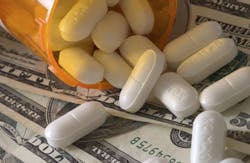Generic drug patent settlements cut costs for health systems, study finds
The U.S. health system saved a total of $25.5 billion between 2005 and 2012 thanks to generic drugs being launched on the market before patent expirations as a result of patent settlements, new research by the IMS Institute for Healthcare Informatics has revealed.
The study was commissioned by the Generic Pharmaceutical Association (GPhA) and also found that patent settlements helped generic medicines reach the market on average 81 months sooner than patent expiry. If the current level of savings continued until every patent in the research expired there could be additional savings of about $61.7 billion, the analysis estimated. Thus, the total amount that the health system could save from settlements exceeds $87 billion, the researchers noted.
Ralph Neas, president and chief executive of the GPhA, commented that for a long time pharmaceutical patent settlements with consideration were believed to add costs to consumers and the government but this new study actually proved that this was not the case. It showed that the effect of patent settlements is entirely positive and has led to billions of dollars in savings. An example of the huge savings that such settlements can lead to is the settlement involving high-cholesterol treatment drug Lipitor, Neas explained. That agreement alone would cut costs by $22 billion over the next four years. It is crucial for lawmakers to understand what benefits such patent settlements can bring, to eliminate any future limitations that could inhibit future patent settlements, he added.
The research focused on 33 molecules that were subject to patent settlements between 2005 and 2012 and calculated the savings that launching low-cost alternatives of patented medicines would bring to the national health system.
RELATED: FDA takes action against Indian pharmaceutical companies
The study also found that the federal government benefited from almost one-third of these savings, or about $8.3 billion. Moreover, savings from patent settlements with consideration, those at issue in the court and legislation, would be between $11.8 and $13.6 billion if these were typical of all settlements, with the federal government's share of such savings estimated at $3.8 billion to $4.4 billion, the study revealed.
The IMS Institute for Healthcare Informatics also analyzed the savings that would have been potentially negated if patent settlements were not implemented as an option. Based on a success rate of 48 percent, as set by an independent study by the Royal Bank of Canada on patents between 2000 and 2009, the researchers found that the total projected savings of $87 billion would have been cut almost to half, to $45 billion, the institute said.
Meanwhile, Neas commented that separate studies by the IMS Institute and the U.S. Department of Labor have indicated that the level of drug expenditure is dropping for the first time in more than half a century and this is largely due to allowing generic medicines into the market. The GPhA believes that generic drugs, including those that are launched through settlements and settlements with consideration, have the potential to dramatically change the pharmaceutical market by making medicines more affordable.
